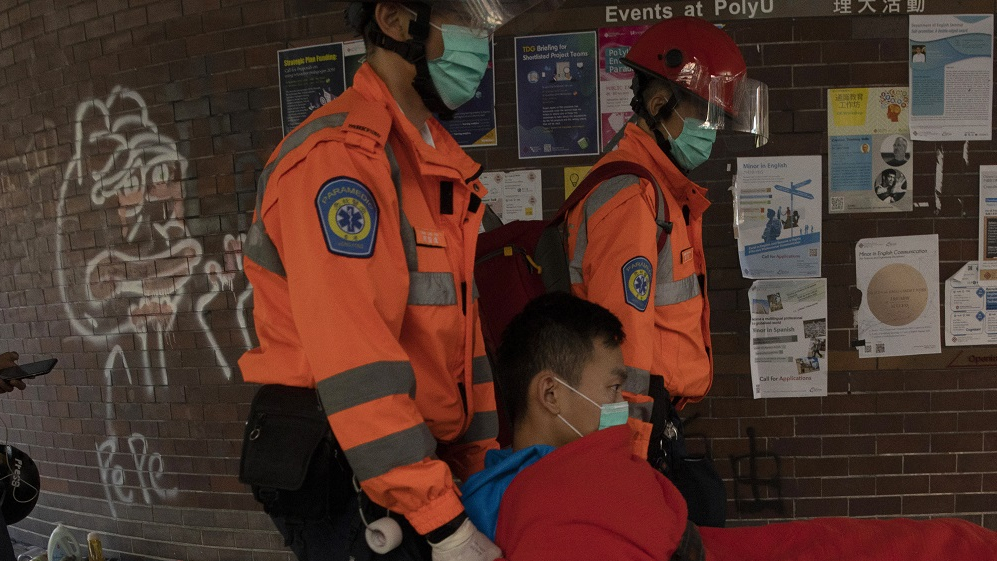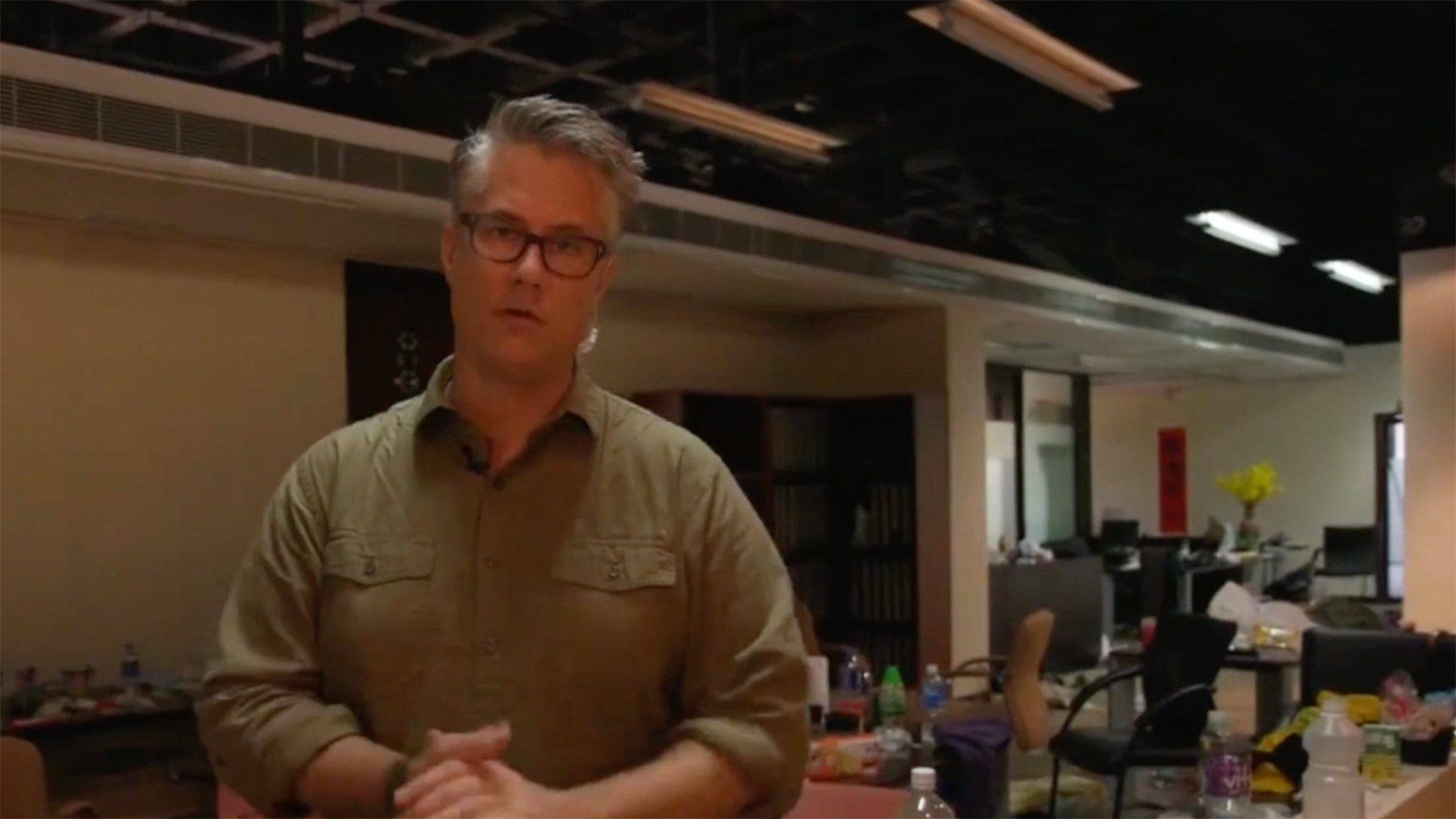
A man is evacuated by medics past graffiti of Pepe the Frog, which has been used as a symbol of Hong Kong's protests, from the Polytechnic University in Hong Kong, November 20, 2019. /AP Photo
A man is evacuated by medics past graffiti of Pepe the Frog, which has been used as a symbol of Hong Kong's protests, from the Polytechnic University in Hong Kong, November 20, 2019. /AP Photo
As expected, the pan-democrats' gains in Hong Kong's district council elections have been widely interpreted as a triumph for freedom and democracy. It is a narrative the Western mainstream media have diligently helped reinforce over the past few months.
And those are the same media and international observers that haven't had a nice thing to say about the results of democratic votes closer to home. In the case of the 2016 U.S. presidential election, the world has witnessed allegations of "foreign interference," a two-year "collusion" investigation; tech companies were held responsible for fake news that was believed to have misled the masses, while half the country was subjected to name calling and ridicule.
On the contrary, the Hong Kong SAR government and pro-establishment candidates accepted their latest setback with grace. In her statement, Chief Executive Carrie Lam acknowledged voters' concerns and promised to "listen to the opinions of members of the public humbly and seriously."
However, when it comes to China's internal affairs, the prevailing consensus in the Western mainstream narrative is that any opposition of Beijing must be good. No "elites" in the Yellow Vests or the Occupy movement were nearly as vilified as a Hong Kong police officer these days. Meanwhile, thuggery is romanticized as heroism, as if it provides a silver lining for the state of Western democracy, a reminder that at least the West stands for democracy. And in the name of democracy, all wrongdoings are justified, excused and glossed over.
A free society under "One country, two systems," Hong Kong shares many political and economic features as well as cultural ties with Western countries. It also means that the city shares many of the same conditions that have bred populism and divisions elsewhere – a widening wealth gap, unaffordable housing and a disaffected young generation locked in their online "echo-chambers".
Read more: Are HK elections a sign of democracy or populist rancor?
Australian journalist Hedley Thomas, who has been covering the protests in Hong Kong, says that the media are glossing over the reality of these demonstrations, which have "morphed into extremely violent attacks on ordinary citizens."
"They (the protesters) are invariably depicted as brave freedom fighters standing up for democracy," Thomas said.
In the run-up to Sunday's elections, considered a barometer of public sentiment, it is believed that "fake news" has played a major role in stoking anger and violence in the city.
According to a video circulating on YouTube and Facebook, a "secret massacre" is apparently taking place right now inside the Polytechnic University as we speak.
01:59

Thomas reported in The Australian that the shocking incident of 57-year-old man Lee Chi-cheung being set alight and badly burned last week by masked protesters was dismissed by some Hong Kong residents as pro-China propaganda to undermine the cause.
Just like those widespread "Pizzagate" rumors in 2016, fake news and conspiracy theories were fueling hostility towards Hong Kong police and authorities for the past few months. However, violent attacks and threats of harm by radical protesters on pro-government candidates, policemen and residents have been omitted, downplayed or dismissed altogether.
The death this month of a 22-year-old protester triggered a major escalation of protests as online rumors claimed the student had been pushed from a car park by police, despite official denials that officers were in the area at the time. Horrifying stories of murder disguised as suicide, rape and death of a 15-year-old girl and people going missing were widely reported before details could be properly verified.
Hong Kong's new police commissioner Chris Tang Ping-keung said last week that fake news could "undermine the credibility of the police force."
Local fact checking Facebook page Kauyim Media, which has more than 140,000 followers, said fake news was "amplifying the fear, hatred and confusion among Hong Kong residents."
"The damage has been done and will take a long time to rectify," the fact-checker said.
Masato Kajimoto, a media professor at University of Hong Kong, said it is almost impossible to verify the authenticity of every image and video that was presented as the "truth." In September alone, no fewer than 5,000 images related to the protests were shared in a single channel of Telegram, the messaging application used widely by protesters.
"It is really hard to win somebody's heart with just facts and accurate information," Kajimoto said. "You have to appeal to people's emotions."
In this febrile atmosphere, people are inclined to uncritically accept information they see that supports their viewpoint, say experts, while genuine, neutral news sources are being drowned out.
There is a sense in Hong Kong that political discussions have gone toxic, with public figures, media and businesses labeled either "pro-democracy" or "pro-China."
"People need to stop using these loaded terms in identifying the two camps," wrote a resident named George about the council elections on a Facebook page. "The opposition is not 'pro-democracy,' at least no more so than the Tea Party in the U.S.. They are simply anti-government or anti-establishment."
"The government lost a PR and propaganda war", he said.